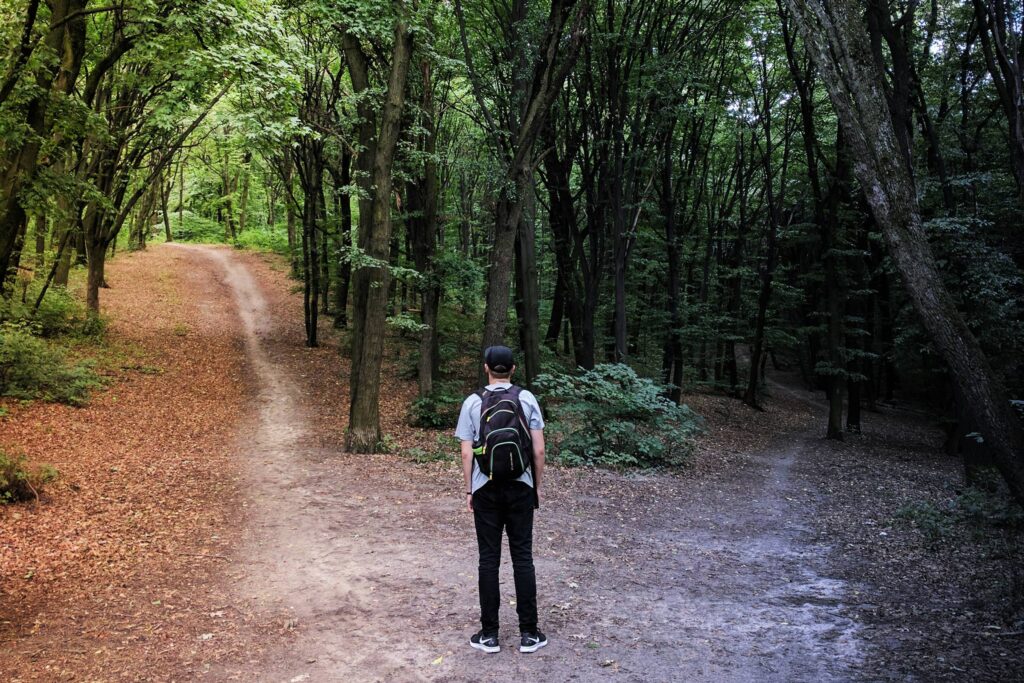Note: This is a guest post by Mike Donghia of This Evergreen Home.

I’m convinced that one of the greatest plagues on happiness, among those whose basic needs are already met, is the curse of hyper-optimizing their lives.
Instead of enjoying the life we have, we spend an enormous amount of effort optimizing every choice to perfectly align with our desires. Some parts of the internet even glorify this behavior, calling it “lifestyle design,” and encouraging followers to chase the life they always dreamed of.
I’m not against people being happy. Not one bit. In fact, I want joy and contentment for everyone reading this. My worry is that this consumerist mindset elevates choosing and selecting to an unhealthy obsession.
My Own Life
I have first hand experience with the costs of trying to optimize my life too far. In college, I spent far too much time ruminating on what I wanted out of life and daydreaming about the endless possibilities before me.
This had the unfortunate effect of making every choice feel monumental in importance. I had a huge fear of missing out on any of the good things that life had to offer and a severe allergy to wasting my time on anything that felt boring or not connected to my self-important goals.
The result was ironic. I did end up wasting a huge amount of time, but that time was spent waffling between decisions. I would start one thing, but then after a little while grow bored with the choice and wonder if another path might lead to a more interesting life. So I would switch course and try another path after a long, emotional decision-making process.
The Downsides of Choosing
Don’t get me wrong, not all choosing is bad. I’m glad to live in a world with choices, but some of my best decisions looking back are the ones that either 1) happened by accident or 2) didn’t feel like choices at all (like falling in love with my girlfriend, now wife).
Here are some of the downsides of choosing that I’ve experienced, and likely you have too:
Choices reduce perceived value. If someone surprises you with a gift, let’s say tickets to join them at a concert or sporting event, that gift registers in your mind as a huge positive. You aren’t comparing that event to every other possible event you could have gone to or wondering if your seats represent the best possible value— you’re just happy to be going.
But if you’re the one in charge of choosing, you might still be happy with your choice, but you carry a small worry that you might have chosen wrong, or would have been happier with a different path.
Choices put you in choosing mode. Choosing mode is what I call that period when you are fixated on comparing the options before you. Instead of just being happy to go on vacation, you’re trying to find what’s better or best about each place you might go— which fixates you on tradeoffs instead of gratitude.
The problem is that you’ll inevitably come across some higher priced options, and in comparison, every other option won’t be quite as nice. In the back of your mind, you’ll always use that as a reference point for what the ideal vacation experience could be. You’d probably be happier if you never knew that option existed, or at least never looked into it and gave it the slightest thought in your consideration.
Choices can lead to analysis paralysis. The hardest choices to make are honestly the ones that are most similar to each other. When I was dating my future wife, I was blessed to have gone on very few dates before her, and not to have used any dating apps. The reason this is a positive is because I didn’t have to compare her to hundreds of other women and weigh the pros and cons— I could focus on enjoying her for who she is and seeing if that feeling was mutual.
We both grew to love each other and see each other as the perfect match, but I believe that is harder to do if you approach dating (or any other choice) with a consumer mentality, like you’re trying to shop for the best possible deal/date.
Choices prevent commitment. I saved this one for last, but it’s actually been the biggest cost in my own life. Going back to the dating analogy, some people have trouble committing in a relationship because they can’t stop wondering if there’s someone else out there even better— more attractive, more successful, a more perfect fit for them. Obviously, you don’t have to settle for the first person you meet, but I think that mentality is a huge trap.
And it’s not just a trap for dating. In my own life, I happily met my wife young, got married early, and have a great marriage. But in other parts of life, such as those related to career and calling, I have struggled with really committing to any goals or paths because I was always trying to keep my options open and see if something even better would pop up. This has led me to be far less content than I would like to be, and have a smaller contribution than I could have possibly made.
Craft a Life with Fewer Choices
Crafting a life with fewer choices is deeply personal. Some choices really do matter, and so you’ll have to decide which ones to slow down for and seek guidance and which ones can be skipped or made quickly.
But I do think there are some principles that can help and have in fact helped me to overcome my own fears of missing out and reduce the number of choices I have to make. To me, this process of applying the principles of minimalism to my decision-making has been even more impactful than the act of decluttering my physical environment.
1. Remove choices altogether. There is real freedom in removing choices and seeking instead to embrace what you already have. You could stop looking for a job, and commit to the one you have. Or let go of dreams that are only distracting you from living your present life well.
2. Narrow your options quickly. One way I waste time is over-analyzing my online purchases. I obsess over reviews, ratings, and features that sound important when comparing, but in reality, aren’t a big deal. A simpler way is to enter your search and decide between the top three products—figuring that what’s good for most people will do the job for you.
3. Pre-commit to decisions in advance. There are certain choices that you want to make once but you don’t want to have to keep making. Some examples might be reading a real paper book in bed rather than scrolling your phone, or not snacking after a certain time in the evening. Decide in advance and stick to your decisions like a contract written in stone, and your life will have many less decision points.
4. Decide organically. Sometimes we choose when we don’t have to. Rather than forcing a decision in regards to who to date, what career to pursue, or where to live—you can wait for a path to become clear and obvious. Many of my best “decisions” didn’t feel like decisions at all, they simply were paths I started walking down and never turned back from.
5. Have someone else choose for you or help you choose. When you really feel stuck in decision-making mode, a great way to break out is asking a friend to decide for you or with you. This works best with someone who really knows you, and can help you decide with less emotional turmoil. If you are an overthinker, making hard choices by yourself is a recipe for paralysis, but it’s not something you have to do on your own.
***
Mike (and his wife, Mollie) blog at This Evergreen Home where they share their experience with living simply, intentionally, and relationally. You can follow along for free by subscribing to their blog or checking out their premium newsletter, Declutter Your Life.



